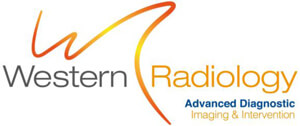What is an MRI scan?
Magnetic Resonance Imaging (MRI) is a safe, painless and powerful diagnostic imaging test. MRI uses a combination of a strong magnetic field and radiofrequency waves to produce images of many of the body’s internal structures. Mainly used visualise the body’s soft tissue structures, MRI also assesses bone structure as well. Areas of the body such as joints, muscles, the brain, spinal canal, the heart and abdomen/ pelvis are common. MRI is able to provide finer detail than most other imaging techniques in these instances and is very safe as it does not use ionizing radiation.
Equipment costs and longer scan times (20-60 minutes) than other types of scan, play in to MRI’s cost meaning it can be more expensive than other tests. Different strength magnets are used in MRI machines and each have their merits. Advancements in technology mean the idea ‘stronger is better’ for image clarity, is no longer universally applicable. At Western Radiology scans are conducted on one of the latest Siemens 1.5 Tesla MRI scanners. Built to cater for medium sized hospitals, this scanner is new to Australia and Western Radiology has one of two currently in operation in Australia. We produce excellent images, which transfers to accurate diagnosis.
Related Information
Please arrive 30 minutes prior to your appointment.
What to bring
- Your referral from your doctor
- Medicare card
- Any previous imaging/ reports
What not to bring
On the day of the exam, you will be required to get changed into a gown and remove all metal items. Do not wear or bring in to the MRI room with you:
- Wristwatches
- Keys and jewellery
- Any other cosmetic surface implanted metals on your body (speak to our staff about this if unsure)
Medically implanted devices and metals may also pose a safety concern as the MRI scanner uses a strong magnetic field that will move ferromagnetic (metal) objects. You must let your doctor know if you have any of the following as it may not be safe for you to be scanned via MRI:
- Aneurysm clips
- Metal Implants
- Steel surgical staples or clips
- An implanted drug infusion devices
- Any implant made partially or wholly of iron or steel
Most metal screws, clips and rods used in surgery are safe to be scanned as they are made of titanium (non-magnetic). Similarly, cardiac (coronary) stents and valves are considered safe to be scanned. Our helpful staff will ask you more about these on the day of your appointment.
If you have any of the following, you cannot have an MRI scan:
- A pacemaker / defibrillator
- Cochlear Implant
- A Neurostimulator
Some of these devices – dependent on manufacture type and year – can be used with MRI scanners. Please speak to our reception staff if you have one of these devices when you place your booking.
MRI is generally considered safe during pregnancy. However, if you are in your first trimester (up to 12 weeks) for the safety of you and your fetus, it is general protocol not to perform an MRI scan because little research has been done on the potential long-term effects of MRI exposure on developing fetuses. Please let your doctor know if you are pregnant or think you may be pregnant.
Prior to the examination, a radiographer will provide you a full explanation of the examination specific to the area your doctor has requested a scan for. The time and set up procedure for the examination will be different depending on the area being scanned. Generally, most scans take up to 20-30 minutes however can take longer dependent on the region and if multiple areas are required to be scanned. It is important that you discuss this with reception at the time of booking to confirm an approximate length of the examination.
An MRI machine has a bore (commonly known as a tube) that patients lie within for the scan, it is open on both ends. After being placed comfortably on the MRI’s bed, patients are raised in to position to slowly enter the tube. You will be monitored throughout the entire scan and the radiographer will be able to talk to you between scans. You will be made comfortable and have the option of your choice of music to listen to during the scan.
To ensure optimal quality of the examination it is imperative that you remain as still as possible. Please talk to our radiographers or your referring doctor if there are any concerns about being claustrophobic inside the MRI machine.
Some MRI scans may require you to have a special dye, commonly called contrast. Contrast can be used to assist in showing greater detail in some anatomical details such as blood vessels or certain tissues. If your scan does require contrast, it will be administered intravenously (generally in the arm). Precaution in the pre-check process is taken to determine if a patient may not be suitable for contrast and this will be discussed with you. For example, conditions such as kidney disease may preclude the use of contrast and a very small percentage of the population may be allergic.
Western Radiology’s group of highly-trained radiologists will interpret and report on the images according to your doctor’s referral. With their sub-specialised training and fellowships covering Neuroradiology, Musculoskeletal radiology, Advanced body and Oncology radiology, and interventions our team are well placed to provide a prompt and reliable diagnosis to your doctor. Results are transmitted via secure electronic means, normally delivered on the next business day to your doctor and we can provide a copy of the images for you on disc for a small fee.
Find a Clinic
Opening hours and clinic locations
around Perth
